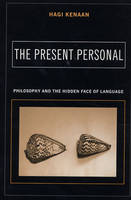
The Present Personal
Columbia University Press (Verlag)
978-0-231-13350-0 (ISBN)
- Titel z.Zt. nicht lieferbar
- Versandkostenfrei
- Auch auf Rechnung
- Artikel merken
Is philosophy deaf to the sound of the personal voice? While philosophy is experienced at admiring, resenting, celebrating, and, at times, renouncing language, philosophers have rarely succeeded in being intimate with it. Hagi Kenaan argues that philosophy's concern with abstract forms of linguistic meaning and the objective, propositional nature of language has obscured the singular human voice. In this strikingly original work Kenaan explores the ethical and philosophical implications of recognizing and responding to the individual presence in language. In pursuing the philosophical possibility of listening to language as the embodiment of the human voice, Kenaan explores the phenomenological notion of the "personal." He defines the personal as the irresolvable tension that exists between the public character of language, necessary for intelligibility, and the ways in which we, as individuals, remain riveted to our words in a contingently singular manner. The Present Personal fuses phenomenology and aesthetics and the traditions of Continental and Anglo-American philosophy, drawing on Wittgenstein, J. L.
Austin, Kant, Kierkegaard, and Heidegger as well as literary works by Kafka, Kundera, and others. By asking new questions and charting fresh terrain, Kenaan does more than offer innovative investigations into the philosophy of language; The Present Personal, and its concern with the intimate and personal nature of language, uncovers the ethical depth of our experience with language. Kenaan begins with a discussion of Kierkegaard's existential critique of language and the ways in which the propositional structure of language does not allow the spoken to reflect the singularity of the self. He then compares two attempts to subvert the "hegemony of content": the pragmatic turn of J. L. Austin and the poetic path of Heidegger. Kenaan concludes by turning to Kant and discovering an analogy between the experience of meaning in language and the aesthetic experience of encountering beauty. Kenaan's reconceptualization of philosophy's approach to language frees the contingent singularity of language while, at the same time, permitting it to continue to dwell within the confines of content.
Hagi Kenaan is senior lecturer in the Department of Philosophy, Tel Aviv University. In addition to studies of aesthetics and the philosophies of Husserl, Heidegger, and Derrida, Kenaan has published poetry and a children's book, One Special Day, Philosophy.
Preface Introduction: Philosophy and the Personal 1. Language and the Bell Jar A Picture Held Us Captive Language's Frame The Fact of the Propositional "This Is How Things Are" The Bell Jar 2. The Limits of Language and the Dream of Transcendence Philosophy and Disappointment Language: The Map Language and Silence: The Example of Abraham The Limits of Language and the Question of Freedom Before the Law of Language From Disappointment to Philosophy 3. Austin's Fireworks Austin's Fireworks: The Promise of the Pragmatic Turn How to Do Things with Austin The Act of Speech The Pragmatic and the Personal The Mirror at Hand: Afterthoughts 4. Personal Objects Heidegger (Before) and (After) Austin Heidegger's Pragmatic Interpretation of the Ordinary The Prison of the Ordinary The Aesthetic Elision of the Personal Van Gogh's Shoes Sabina's Hat 5. Language Unframed: Beauty as Model It's Funny Aesthetic Judgment The Language of Taste The Phenomenality of Your Words 6. Personal Time The Time Is Past Time and the Language of Possibility Time Prefaced Perhaps Present In My End Is My Beginning Epilogue Notes Index
| Erscheint lt. Verlag | 9.2.2005 |
|---|---|
| Zusatzinfo | 1 diagram |
| Verlagsort | New York |
| Sprache | englisch |
| Maße | 140 x 210 mm |
| Themenwelt | Geisteswissenschaften ► Philosophie ► Erkenntnistheorie / Wissenschaftstheorie |
| Geisteswissenschaften ► Philosophie ► Sprachphilosophie | |
| ISBN-10 | 0-231-13350-2 / 0231133502 |
| ISBN-13 | 978-0-231-13350-0 / 9780231133500 |
| Zustand | Neuware |
| Haben Sie eine Frage zum Produkt? |
aus dem Bereich

![Was heißt Denken?. Vorlesung Wintersemester 1951/52. [Was bedeutet das alles?] - Martin Heidegger](/media/113619842)
